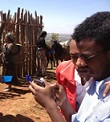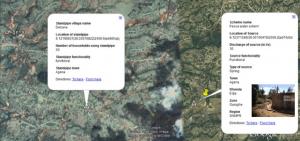Field testing is showing that mobile phones have an important role in water sanitation monitoring in Ethiopia.
Published on: 04/03/2013
Can the use of mobile phones help in improving WASH monitoring in Ethiopia? 'Yes', is the preliminary answer to this question, based on first field testing of the use of mobile phone technology for WASH data collection in Ethiopia by the Ministry of Water and Energy, in cooperation with IRC International Water and Sanitation Centre and support from World Vision in February 2013.
In 2010/2011 the Ethiopia Ministry of Water and Energy (MoWE), in collaboration with key sector organisations, undertook a National WASH Inventory. This was an impressive exercise, collecting WASH data from all communal rural, small town and urban water schemes, about 100,000 in total.
WASH data was collected from 20,000 health clinics, 30,000 schools and 12 million households. A number of challenges were encountered relating to paper-based data collection.
In addition, WASH data was collected from 20,000 health clinics, 30,000 schools and 12 million households. A number of challenges were encountered relating to the paper-based data collection, which included lengthy data entry and cleaning procedures, and poor data quality, with a lot of missing and incorrect data, including major issues with the GPS data. As it is the ambition of the Ministry of Water and Energy to undertake similar data collection exercises on a regular basis (at least every 2-3 years), it is important that these challenges are addressed.
The use of mobile phone technology for data collection and data transfer can help circumvent some of the problems associated with paper-based surveys, including the time it takes to enter data and the high data entry error rates. Furthermore, making data instantly available through an online, secure interface, could facilitate identifying problems with data collection in real time and taking corrective measures instantly.
AKVO FLOW (Field Level Operations WASH) is a system that combines mobile phone technology with (secure) online data storage. It has been applied by a number of organisations and governments in various countries, including:
In Ethiopia, the Ministry of Water and Energy and IRC International Water and Sanitation Centre are interested in assessing the potential of FLOW in facilitating and improving data collection processes for WASH inventories in Ethiopia. A first step was taken in the last week of February 2013, with a first small-scale field demonstration, supported by World Vision International, at the Fessa water scheme in Agana town, SNNPR, implemented by World Vision in 2008.
Making data instantly available through an online, secure interface could help identify problems with data collection.
Data collection was undertaken by World Vision field staff Bereket Seif and Tesfahua Elias, who, after a brief explanation, confidently used the phone to collect data from the piped scheme, its source and a number of standpipes. After submission of the data in the field, the data was automatically transferred to the online FLOW instance, through the Ethiopian phone network, from where the data could be accessed.
After this successful field test, the Ministry and IRC are interested in piloting this technology, by collecting up-to-date WASH data from all facilities in one pilot woreda. This pilot is expected to be undertaken within the next two months. If successful at this scale, opportunities will be explored for upscaling this to national level.
Check this blog regularly to keep yourself updated on these exciting developments related to WASH monitoring in Ethiopia!
Posted by Marieke Adank, 4 March 2013

Bereket and Tesfahua collecting data using mobile phone at standpipe, while market women fetch water for themselves and their animals

Some of the data collected using FLOW, presented in Google Earth
At IRC we have strong opinions and we value honest and frank discussion, so you won't be surprised to hear that not all the opinions on this site represent our official policy.